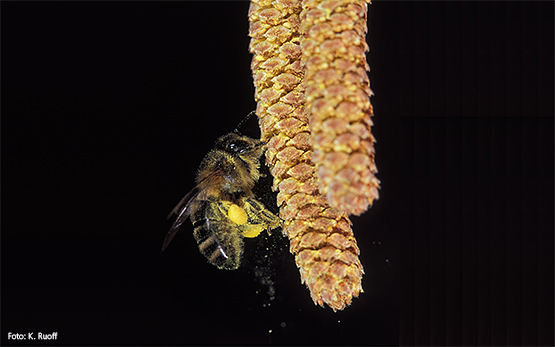Pollen is the main source of several nutrients that are essential to honey bees. Consequently, an appropriate pollen intake is crucial for ensuring the long-term survival of a colony, and for maintaining its productivity. One of our study dealt with the botanical composition of the pollen collected by the bees, and its protein and mineral content. In this article we also tackle the issue of the impact of pollen on the physiology of the honey bee, as well as evaluating the pollen needs of worker larvae and adults.
The consumption of pollen affects the development of the young worker bees' hypopharyngeal glands. The secretions of these glands are rich in protein, and are an important component of larval food. A direct link between pollen suppy and brood rearing is likely. Consequently, pollen availability is without doubt a key parameter influencing the development of honeybee colonies. The diversity of the pollen available to the colonies is a research topic that we have followed up over time and again recently with the COLOSS network's pan-European experiment 'CSI pollen', which we coordinated for Switzerland.
In collecting pollen, honey bees fulfil an ecological function by enabling pollination, i.e. by transferring the male gametes of the plant (pollen) to the female reproductive organs of other flowers. This allows the production of seeds, and hence of the fruit containing them. Our pamphlet - 'Bee pollination of flowering plants - biology, ecology, economy' - teaches inter alia the importance of the pollination of cultivated and wild plants by bees, and the economic impact on agriculture of the pollination work performed by them.






